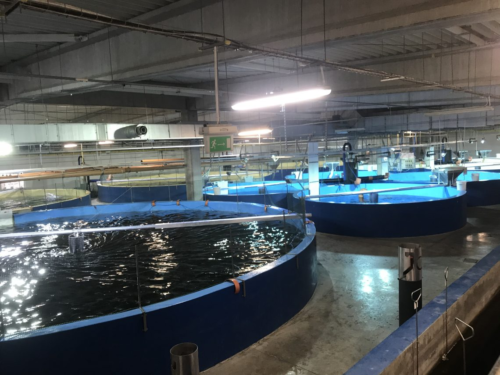Questions are being asked about the future of Singapore based fund 8F’s investment vehicle, Pure Salmon.
For years, Pure Salmon has attracted much attention for its plans to build a string of recirculating aquaculture systems (RAS) salmon farms around the world with the target of producing some 260,000 tonnes of salmon per year globally once all of its planned facilities are operational.
Its slick marketing helped create the impression that ultimate triumph of land-based salmon farming was all but inevitable.
To this end, Singapore-based 8F, a private equity management firm, has raised at least $358 million from investors eager to get in early on the next big thing.
Such is the scale of Pure Salmon’s ambition, that were it to succeed in realising its production targets, it would be the world’s third largest fish farming company, behind only Mowi and SalMar.
Key to this ambition was the company’s partnership with AquaMaof, the Israel-based leader in RAS technology with which the salmon producer owned a small trial facility in Poland.
In January, however, SalmonBusiness reported on the divorce of Pure Salmon from the Israeli company.
Divorce
Now it has been confirmed that as part of the settlement, AquaMaof took control of the facility in Poland, meaning Pure Salmon is, after four years, producing even less salmon than ever.

Perhaps in anticipation of this divorce, and to calm investors nerves, in September 2021, 8F acquired the aquaculture division of Krüger Kaldnes from Veolia. It named the new company, Pure Salmon Kaldnes RAS.
And although Kaldnes counts among its previous clients some of the world’s largest fish-farming companies, including Lerøy and Mowi, the company has no track record of producing harvestable fish. Relatively low risk, smolt production is a very different game from full scale RAS production of harvestable fish, and long term salmon watchers will know Kaldnes has lost a lot of money building these facilities.
Tangible progress?
Now, the press is starting to question the lack of action (including a mystery blog, seemingly with an axe to grind).
The bigger question is: Do Pure Salmon actually have the billions of dollars required (or the competence necessary) to execute their elaborate plans? And when will we see tangible progress?
8F Asset Management partner Yoram Layani declined to comment further.
For investors who now been waiting more than four years for tangible signs of progress, the outlook must be looking more uncertain than ever.


